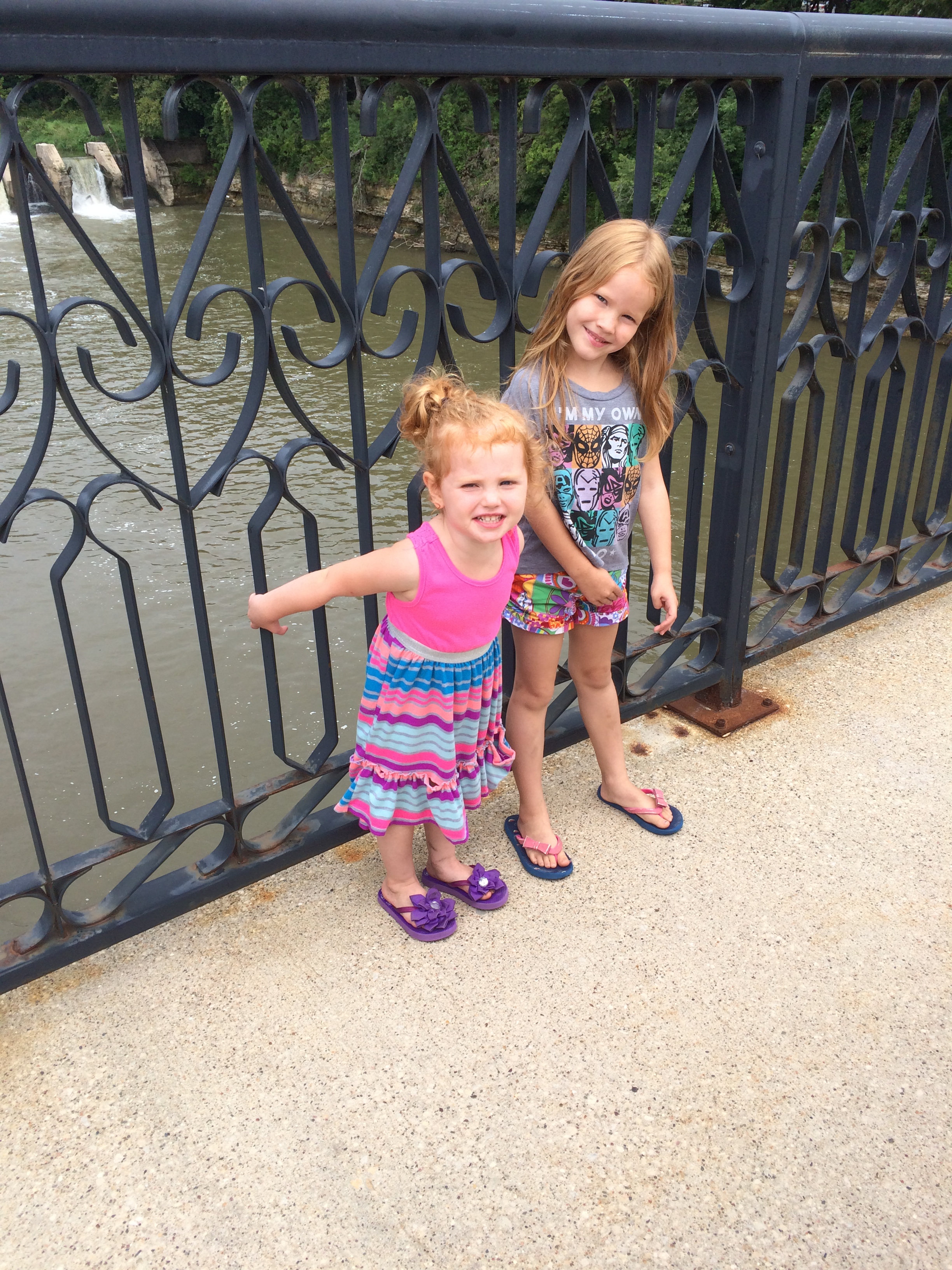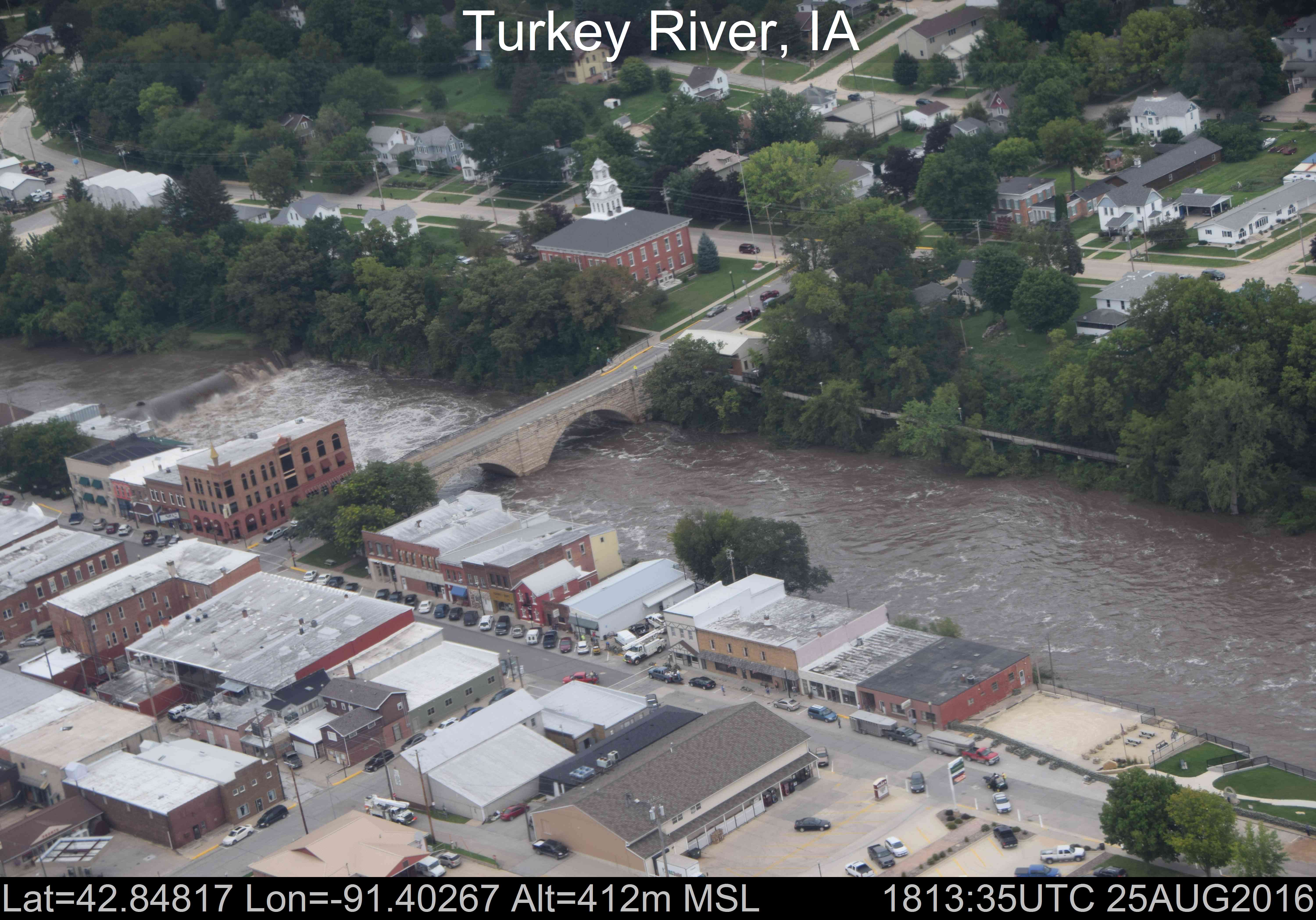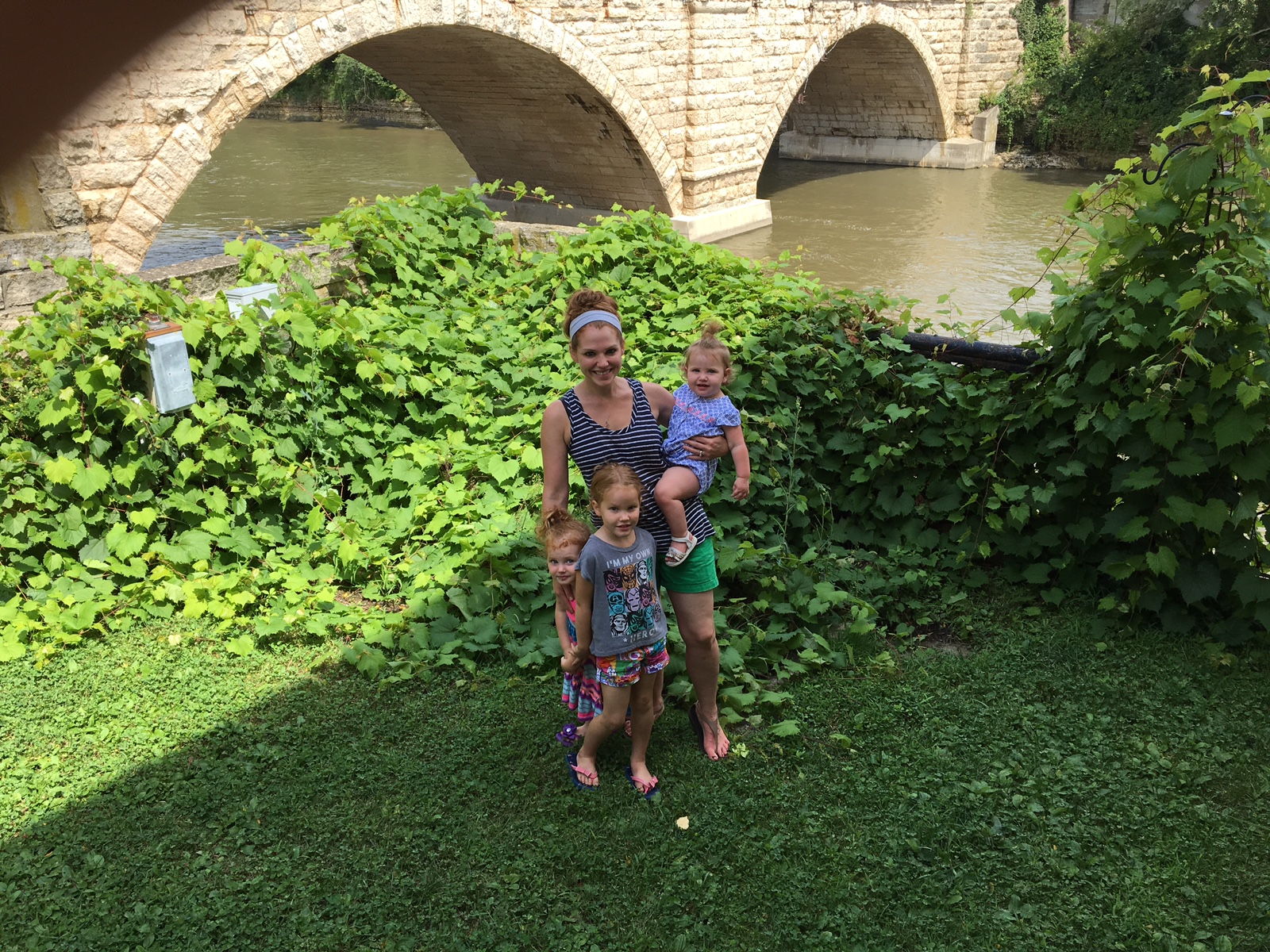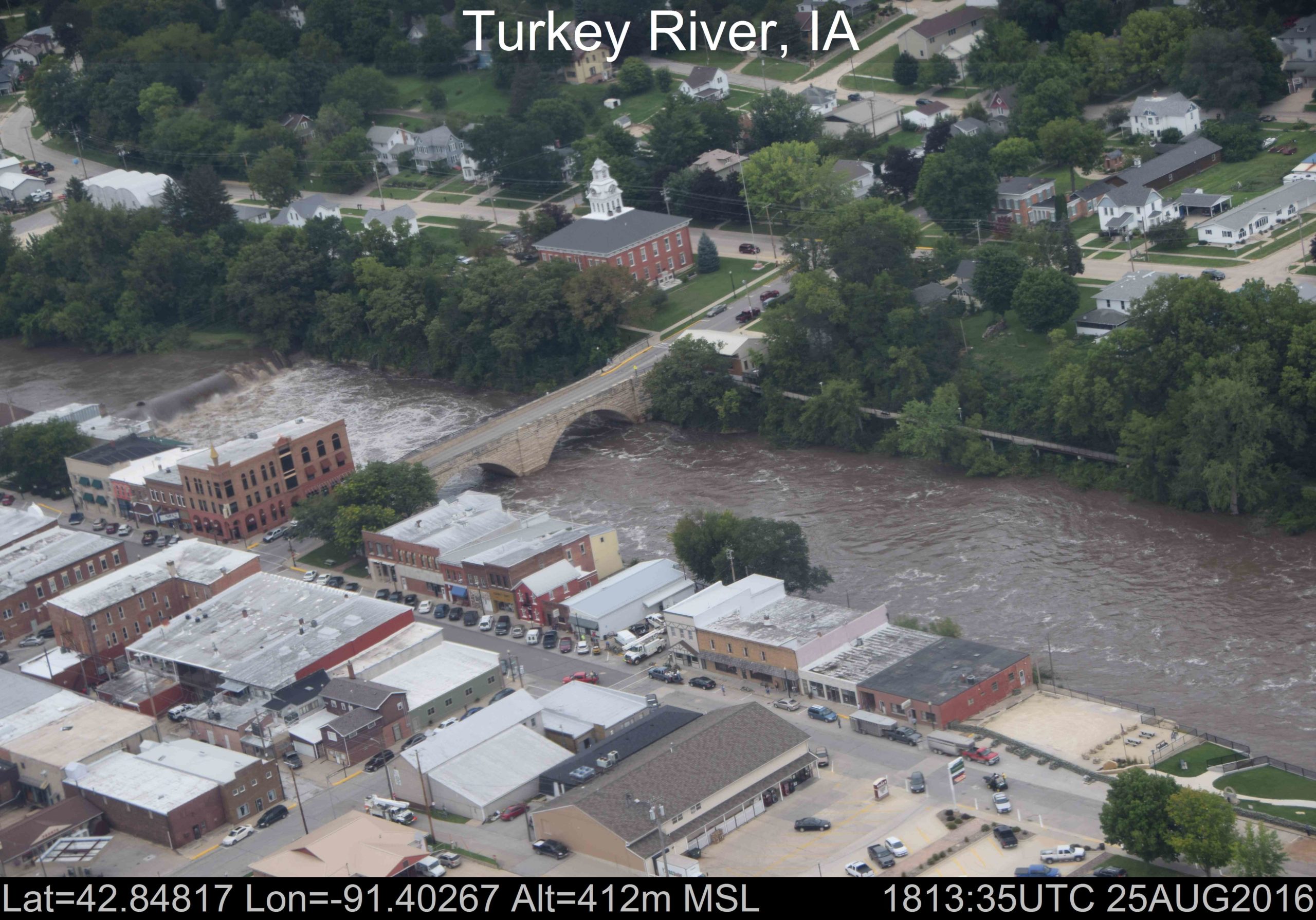Precision agriculture is a unique, emerging field, and it is certainly one that is rapidly evolving before our very eyes. The complex world of remote sensing, big data, ag informatics, statistics, and on-the-ground farm management means there’s a whole lot of data out there … how do we make sense of it all?
Continue readingWinter Weather in Iowa
This winter, we have experienced a mix of snow, rain, sunshine, and even warm temperatures. With this variability evidenced across the state, it is important to document what we’ve evidenced so far and to anticipate the weather to come over the upcoming months. Below is a brief overview of the recent, current, and anticipated weather and water conditions for Iowa.
Continue readingVillarini Receives AGU Macelwane Medal
When Gabriele Villarini heard the news that he had been chosen to receive the American Geophysical Union’s James B. Macelwane Medal, this normally unflappable researcher got pretty excited.
Continue readingWater Resources Research National Competitive Grants Program Now Open
Funding alert – the National Institutes for Water Resources in conjunction with the US Geological Survey has issued their call for proposals for the 2017 104(g) National Competitive Grants program.
Continue readingCedar River Watershed Coalition Meeting Recap
On Friday, October 29, I had the good fortune of heading northeast to Parkersburg, Iowa for the Cedar River Watershed Coalition’s Fall 2016 meeting. This group has been convening since February of 2010, and I’ve made it to a few meetings in my time at the Iowa Water Center.
Continue readingWhen it comes to water…
From Melissa Miller, Iowa Water Center Associate Director
What a difference a week makes. Last Friday, my family and I made a lunch and relaxation stop in Elkader on our way to Wisconsin for a weekend getaway. My girls love water, so we walked over the Keystone Bridge for a good look.

Hana, 3, and May, 5 pose near the Turkey River in Elkader on 8/19/16.
Just a week later, Elkader and other Northeast Iowa residents are dealing with severe flooding from torrential downpours earlier in the week that dumped as much as 8″ of rain in some areas, causing damage to homes, businesses, and even killing one person swept away in the flash floods. Some residents had to evacuate their homes and take shelter elsewhere (including fish!). The water that makes these communities peaceful, beautiful places to live and visit can also pose severe challenges.

Flooding of the Turkey River in downtown Elkader as taken by NOAA’s National Operational Hydrologic Remote Sensing Center’s Airborne Snow Survey airplanes.
This storm is a solemn reminder of the power of water and the importance of studying it. Our seed grant RFP will be released soon, and this year we are partnering with other Water Resources Research Institutes in the Mississippi and Ohio River Basins to share knowledge so that we’re advancing our understanding together. In addition, the Iowa Watershed Approach has already begun work in communities to help address flood and water quality risks and increase community resiliency to events like the ones this week. Related to flooding, up-to-date flood information is available through the Iowa Flood Information System (IFIS).
IWC’s overarching goal is to improve management of water resources. “Management” might not be the best term, because in many cases, water (and nature) does what it will. There’s a parallel between “managing” water and “managing” children – no matter what you want out of it, the true nature of the water (and the child) will always rise up.

One of many attempts at a “nice” family picture at the Keystone Bridge. Getting kids to look at the camera with serene smiles can be as difficult as telling a river or a rain cloud exactly where to run or when to empty.
FUNDING OPPORTUNITY: IWC’s 104(b) competition
At long last, the Iowa Water Center has released the request for proposals for the 2016 104(b) seed grant competition. Proposals are due November 16, 2015. This year, there are two programs for which to apply:
Seed Grant Water Research Competition
Funding of up to $30,000 for one year is available for researchers at one of Iowa’s accredited public or private universities or community colleges. Multiple year projects will be considered for the seed grant water research competition, but continued funding for subsequent years is subject to the availability of funds and progress made in the first year. The proposal must indicate what results/products can be achieved in each individual project year. Subsequent year funding is not guaranteed. Researchers seeking second-year funding must resubmit their proposal showing a new budget and progress made.
Priority will be given to projects that show potential for attracting additional grant money from state, federal, and other sources to support the research program. If funded, two short but required reports must be completed during the project year as a USGS requirement. The Iowa Water Center will also request a fact sheet from your work and a contribution to the Iowa Water Conference in the form of a poster or presentation.
In subsequent years, the Iowa Water Center will contact investigators to survey future impacts resulting from the seed grant funding, including “follow-on funding” and partnerships made as a result of grant activities.
The Iowa Water Center anticipates funding one seed grant in 2016.
Graduate Student Supplemental Research Competition
Funding of up to $5,000 for one year is available to graduate students nearing completion of their program of study. This program is designed to allow students to complete additional research objectives or products beyond the scope of their current water related funded project. The proposed budget must also include funds for publication costs; students will be encouraged to submit their research to peer-reviewed publications. Iowa Water Center staff will be available to help facilitate such submissions.
The Iowa Water Center anticipates funding two graduate student supplemental grants in 2016.
Priority Area for 2016: nutrients
This year’s focus will be on nutrients and their impact on Iowa’s waters and water management decisions. Excess nutrients in Iowa’s waters contribute to significant water quality issues, both locally and downstream. Public awareness of nutrient-related water quality issues is rising along with pressure on legislative bodies to address nutrient management issues through regulation.
Nutrients in water is a broad topic that may encompass any of the following areas related to excess nutrients in surface and ground water:
- land use implications
- tile drainage management
- sedimentation and phosphorus loss
- eutrophication
- water quality monitoring
If you have any questions about this program, please contact Melissa Miller.
2015 Iowa Water Conference Water Resources Priorities White Paper
We’ve been putting on the Iowa Water Conference in its current form for nearly a decade (2016 will be the 10th annual!). For the most part, we’ve got the successful conference formula down, but the conference planning committee is always looking to add in new elements to the conference to keep it relevant and fresh. In 2015, we had this idea: since the Iowa Water Conference brings together upwards of 400 water professionals, teachers, students and community members in one place, shouldn’t we find out what’s on their minds? And thus, the idea for a water resources priorities white paper was born.
At the end of the conference (after Neil Hamilton’s talk on the DMWW lawsuit), we invited people to stay for one final general session: a guided discussion on water resources in the state that would then be summarized into a white paper for distribution. Iowa Water Center Director Rick Cruse and the Iowa Association of Municipal Utilities Director of Stormwater Services Pat Sauer led the discussion and took notes. Afterward, Dr. Cruse compiled the notes into a one page document that was then reviewed and edited by the conference committee and IWC’s Advisory Board. We’ve just started distribution of the document this month – starting with handing out copies at the Conservation Districts of Iowa Conference and a presentation to the Water Resources Coordinating Council last week.
The white paper is available on the Iowa Water Center website, and we recommend you read the entire thing. But in case you want the cliff notes version, here are some of the key points:
- There was a lack of call for greater investments of public money in Iowa’s natural resources- instead, stability of existing funding was repeatedly identified as imperative to successful and effective programs.
- Soil quality and soil management were highlighted as important to both urban and agricultural watersheds.
- The Iowa Nutrient Reduction Strategy was the most oft mentioned water quality topic, and attendees considered the establishment of goals and timelines, along with water monitoring, as vital to public acceptance of the strategy.
- Building partnerships and collaborating with one another was identified as critical to success. As an example, the most successful watershed projects have consistent coordinators that build partnerships among different stakeholders, broadening the circle of participants and resources with which to address problems.
- Education about soil and water related issues is a need in the state, both in the K-12 arena and for adults. It was suggested to have a statewide media campaign to raise watershed awareness.
The white paper gave us some insight to what’s important in the Iowa water landscape, but it also produces several questions. How can we address these priorities in an effective way? The document posted on the web provides five follow up questions. Continue the discussion. Use the questions as a discussion starter in your class, your family, with your legislator or watershed coordinator or neighbor. Then tell us what you come up with. We’re listening.
RESOURCES: Advanced Technology Environmental and Energy Center
Guest blog written by Heather Ballou, ATEEC Interactive Learning Lab Education Coordinator
The Advanced Technology Environmental and Energy Center (ATEEC) first opened their doors in 1994 as a National Science Foundation’s Center of Excellence. For the last twenty years, ATEEC has been providing high-quality publications focusing on different conservation employment categories, compiling and vetting curriculum for all schooling levels, and facilitating expert panels. The newest publications released by ATEEC are Defining Water Management and Regional Water Conversations. ATEEC facilitated a series of six regional water forums. The conversations allowed ATEEC to obtain a snapshot view, from water experts across the country, of new and existing water management jobs and determine regional employment opportunities. This information is compiled into a series of reports and charts. To see the water management reports and others, please visit ateec.org.
ATEEC is also home to the Interactive Learning Lab. The Lab is a great location for middle school and high school students to visit and learn more about green topics. A hands-on permanent display allows visitors to explore the topics of energy and green homes, along with wind, solar, geothermal, and biofuel energy sources. Visitors include field trip groups from all school districts in the Quad City area, after-school programs, and other specialty groups.
The Interactive Learning Lab also is a source of curriculum and activities for local educators. Through our Carver Lending Library, we are able to provide unique learning experiences for students in their own classrooms. Workshops are held throughout the year to introduce teachers to different green topics and familiarize them with the items available through the Carver Lending Library.
The permanent display at the Lab focuses on water conservation. For many students, this is the first time they have seen a rain barrel and offers a great opportunity to discuss landscape water use. The water conservation activity encourages students to predict what simple household changes translate into the largest amount of water saved. The students leave the station with simple ideas they can do to influence their family’s water use.
A few weeks ago, the ATEEC Interactive Learning Lab was able to assist 25 regional boy scouts working on their Sustainability Merit Badge. During this half-day intensive workshop, the boy scouts looked at water conservation. They performed an experiment to determine how much water is wasted by a leaky faucet in one year. The amount of water was staggering. The scouts discussed ways they can conserve water in their homes. Shorter showers, turning off faucets when not in use, and fixing any leaks were just a few of their solutions.




